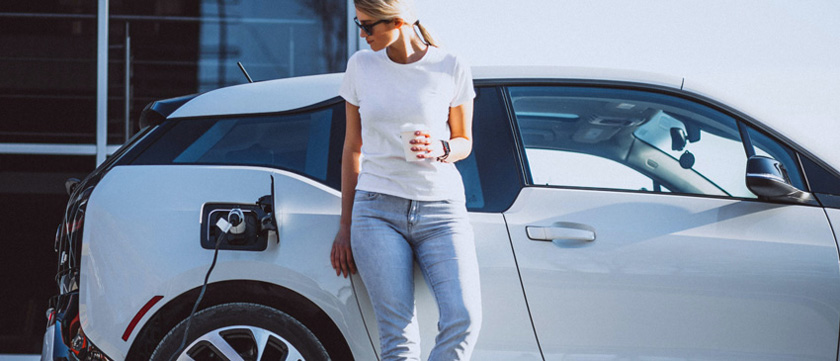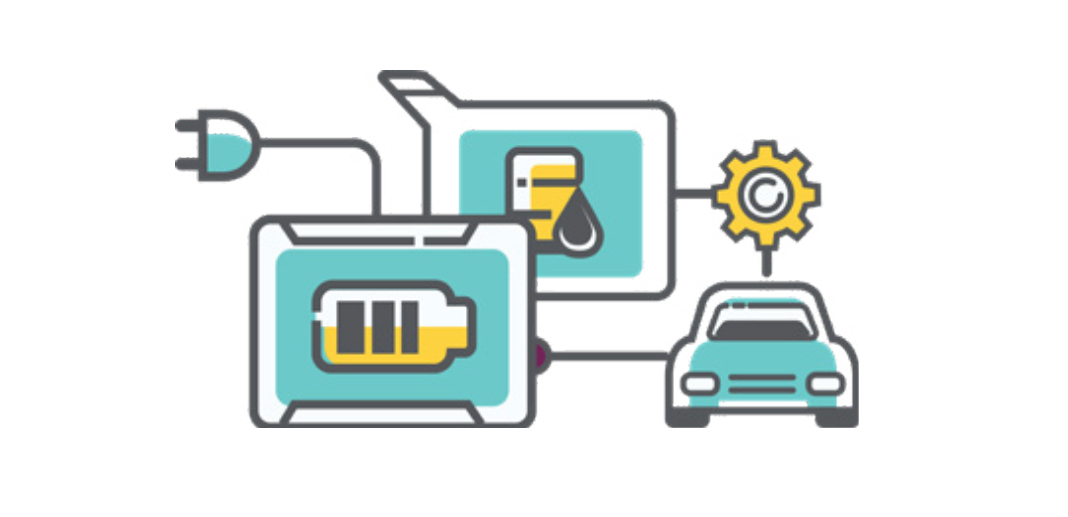Electric Vehicles (EV)

Go Green and Save with an EV
Whether you choose pre-owned or new, we’re here to help you make informed decisions and we understand it’s a significant household purchase. Learn about getting started on the road to ownership, what’s involved along the way, and how to maximize your cost-saving benefits while going green with your EV.
Take advantage of our EV Buyers Guide to help make the process easier and learn how you can save.
A Few Questions to Help Guide Your Decision
Is your daily commute less than 250 miles?
Most electric vehicles have a driving range of 50 to 330 miles. If, like most Californians, your daily commute is less than 100 miles, there is probably an affordable EV model to fit your needs. Visit EV Buyers Guide to learn more about the variety of options available.
Do you take long road trips?
Commuting in an EV is a great way to save money on gas and maintenance, however road trips can require additional planning. While public charging infrastructure and battery technology is continually improving, and locating charging stations is becoming easier each day, uncertainty around charging station locations even in California (which has the most EV chargers in the U.S.) can be stressful. While many EV models offer a range-per-charge of 150 to 250 miles or more, it’s important to plan accordingly to make sure you can find fast chargers in remote places or small towns along your route.
Does your household have more than one car?
If you have more than one car now, consider an EV for your next vehicle. It’s a great opportunity to save and help the environment and, because they are so great to drive, most households end up using their EV as their primary vehicle.
Do you park in a garage or driveway with access to power?
Because EVs require charging, you’ll need direct access to either a standard 120V outlet or a 240V charger in your garage or driveway. Level 2 Electric Vehicle Supply Equipment (EVSE) can substantially reduce charging time and is more energy-efficient.
Do you want to save costs and curb pollution?
Zero-Emission Vehicles (ZEVs) make it easy to save costs and pollute less. EVs use electricity typically generated from cleaner sources than fossil fuels.
Learn how SCE customers saved time and costs by making the switch to EVs here.
Different Types of EVs

Electric Vehicles
Electric Vehicles (EVs) are all-electric and rely on rechargeable batteries. They have electric motors and are charged through external electricity sources, such as standard wall plugs or dedicated wall chargers. They produce zero direct emissions.

Plug-in Hybrid Electric Vehicles
Plug-in Hybrid Electric Vehicles (PHEVs) combine their gasoline engines with electric motors. PHEV have rechargeable batteries, charged by external electricity sources and regenerative braking, which returns the energy created during braking back to their batteries.
There are many reasons to switch to an EV. For starters, they cost less to operate by substantially lowering maintenance and fuel costs. Charging your EV may cost less than half as much as fueling a standard gas car. Plus, you can save even more with federal and state tax credits and rebates. We’ve put together a helpful video explaining some of the benefits of EV ownership and how to make an informed buying decision.
Learn how SCE customers saved time and costs by making the switch to EVs.
Ready for the switch to an EV? Now is the time to start researching EV models to find one that may best fit your lifestyle. Seriously consider a pre-owned EV – they offer great value, especially if it’s important for you to save on the purchase price. And whether you choose pre-owned or new, you may qualify for rebates. Explore your options, and you’ll find an EV for your budget and driving habits. ;
Find the right EV for your lifestyle.
Should I buy a new or pre-owned EV?
Whether your EV is pre-owned or new, we understand it’s a significant purchase for your household. We designed our EV Buying Guide to help make the process smooth and easy. Explore pre-owned and new EV inventory in your area, rebates, incentives, and more.
Charging your EV requires plugging into an outlet or a charger connected to the electric grid or electric vehicle supply equipment (EVSE). There are three main types of chargers that deliver different amounts of energy based on the amount of power the charger can deliver:
Level 1 120 V Charging
With Level 1, you can charge your vehicle through a 120-volt AC plug, which does not require installation of additional charging equipment. Level 1 can typically deliver two to five miles of range per hour of charge, and a full charge may take up to 24 hours. This type of charger application is often used in homes and may be used at workplaces.
Level 2 240 V Charging
Level 2 chargers provide charging through a 240-volt AC plug and require the installation of additional extra charging equipment installed by a qualified electrician. A level 2 charging station system may also provide slight energy efficiency benefits over Level 1 chargers depending upon the length of charge time.
DC Fast-Charge
These charging systems provide power through a 480-volt AC input and require high-powered charging equipment and special equipment in the vehicle itself. This type of equipment is used in public charging stations (Plug-in hybrid electric vehicles typically do not have fast-charging capabilities).
Learn more about charging options in this 1-minute video.
Depending on your driving style and the distances you travel each day, you may be able to meet your driving needs with basic Level 1 charging at home. To reduce your charging time, you may want to consider installing a 240 V Level 2 system. Be sure to consult with an electrician and note that the installation of a charging system might require significant electrical upgrades to your home.
You can save money when you drive an EV. With a number of rebates available for both new and pre-owned EVs to incentives available for eligible EV equipment, your EV can help lower your household expenses.
Learn about our Pre-owned EV Rebate.
Discover personalized incentives.
Let’s get you on your way. After you take a test drive and decide on the right EV for you, be sure to use our resources to find the rate plans and additional rebates and incentives available to qualifying EV owners.
SCE offers special Time-Of-Use (TOU) rates for qualifying EV drivers. On a TOU plan, you can take advantage of great electricity rates during low-use hours. Check out the available plans and select the one that may work best for you.
Frequently Asked Questions
Whether you’re commuting to work or running errands around town, there’s an EV to suit your driving style. Watch this 1-minute video that goes over the benefits of making the switch from a gas-powered vehicle to an EV. Find your EV here.
Yes, there are various rebates and incentives available to qualifying EV owners including SCE’s Pre-Owned EV Rebate program. Learn how you can receive a $1,000 or $4,000 rebate based on household income.
View all of the rebates you qualify for using our rebate comparison tool.
The Clean Vehicle Rebate Project (CVRP). If you buy or lease an eligible new zero-emission or plug-in hybrid light-duty vehicle, you can get an additional rebate of up to $4,500.
With the Replace Your Ride program, when you replace your high-polluting gas vehicle with a hybrid or electric vehicle, and you could be eligible to receive up to $9,500.
You can power up your EV at home or on the go. Find the charging station nearest you with our locator guide.
